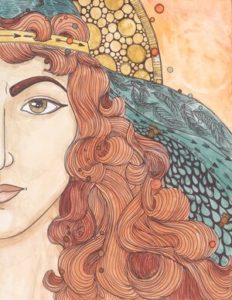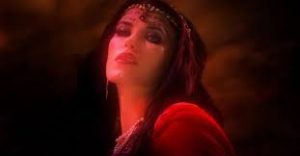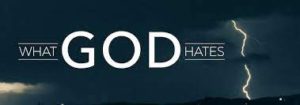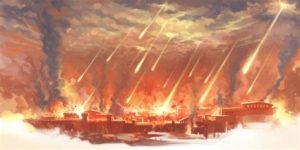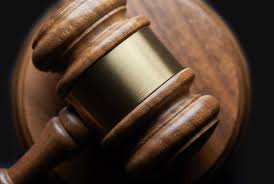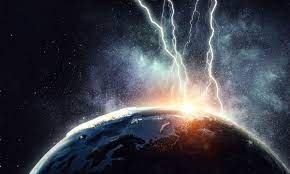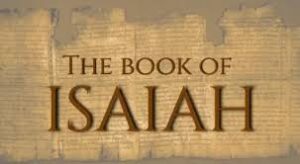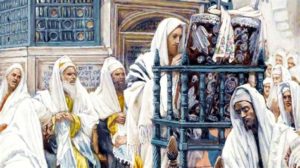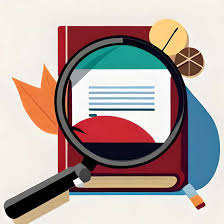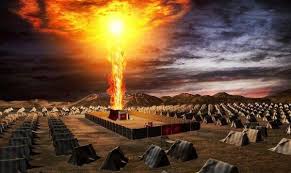Ap – They Will Beat Their Swords into Plowshares 2: 1-4
They Will Beat Their Swords into Plowshares
2: 1-4
They will beat their swords into plowshares DIG: The Mountain of the LORD refers to the site upon which the Temple in Jerusalem was built (11:9; 24:23; 27:13; 56:6-7). What picture does Isaiah envision? Why are so many coming to the Temple? What will God do for them? What is meant by the Last Days (see Acts 2:17; Hebrews 1:2)? Why does Isaiah call Judah to come to the Temple at this time?
REFLECT: Which of your swords and spears (A mean streak? Angry outbursts? A cutting tongue?) has God transformed into tools for peace? What does the New Covenant make of Isaiah’s vision? Will Jesus inaugurate this year of peace? If so when will it be consummated? Why do you think so? How might this vision of ADONAI’s Kingdom shape your hope? Prayers? Values?
The mood shifts very quickly from Chapter 1. There, repentance was viewed as a hypothetical possibility, and restoration – the end product of divine discipline. The emphasis there was Judah’s hypocrisy, rebellion and injustice. Without any transition, the emphasis suddenly changes to Isra’el’s glorious future where she will be a light to the Gentiles (Luke 2:32). Micah 4:1-3 mirrors this passage almost word for word.
This is a second introduction and signals the beginning of specific prophecies in Chapters 2 through 4 after the general introduction to the book as a whole in Chapter 1. The message recorded in these verses is what Isaiah, son of Amoz, saw concerning Judah and Jerusalem (1:1). The prophets of Isra’el had, at one time, been called seers because of their divinely given power to see or foretell what would happen (First Samuel 9:9). Here Isaiah was foretelling the future of Judah and Jerusalem in the messianic Kingdom. Because of ADONAI’s covenant promises to Abraham, Moses and David, Isaiah knew that Isra’el would once again dwell in the Land and have a superior position among the nations (see the commentary on Revelation, to see link click Fj – My Chosen People Will Inherit My Mountains).
Isaiah looks into the far eschatological future and sees the chief among the mountains. In the last days the mountain of ADONAI’s Temple will be established as preeminent, or chief, among the mountains (2:2a). It is the mountain where the Temple, during the messianic Kingdom, will be built (Ezeki’el 40-43). In the Bible, mountains often picture kings or kingdoms (Dani’el 2:35; Amos 4:1). Here, God’s rule from this mountain and Temple will be preeminent. The theme of the preeminence of the Temple in Jerusalem is repeated many times in the prophet’s book (11:9, 25:6-7, 27:13, 30:29, 56:7, 57:13, 65:11 and 25, 66:20). Isaiah clearly wanted his readers to be aware that ADONAI will protect His covenant nation despite their spiritual insensitivity, and in spite of the fact that they would go into captivity. Other Bible passages make it clear that these would be fulfilled in the Millennium, Messiah’s thousand-year reign on the earth (Revelation 20:4b-5). Because of God’s covenant promises with Abraham, Moses, and David, Isaiah knew that Isra’el will again be in the Land and will again have a superior position among the Gentile nations.
As for timing, this prophecy points to the last days. This phrase is always eschatological, dealing with Messianic times. In the messianic Kingdom, Isaiah sees a mountain that is the highest mountain of all other mountains, and the center of Kingdom worship because it will be raised above the hills (2:2b). Zechariah 14:10 explains how this mountain came into existence, but the one who gives the details of what this very high mountain is all about, is Ezeki’el in Chapters 40 to 48. When the messianic Kingdom is established, the tribes will be divided differently than in the days of Isra’el’s history. When Isra’el possesses all of the Promised Land from the Euphrates in the north to the River Egypt in the south, the first seven tribes will be assembled in sequence from north to south. Between the tribes, the mountain of the ADONAI’s Temple will be established.
A fifty-mile square plateau will be established on the chief among the mountains, or the highest mountain in the world. South of it will be the other five tribes. This fifty-mile plateau will be subdivided into three segments; the northern segment will be twenty miles by fifty miles, the center segment will be twenty miles by fifty miles, and the southern section will be ten miles by fifty miles. In the northern section there will be the millennial Temple, the fourth Jewish Temple and the largest of them all, which will be one mile square. It will be too big to fit in the current Temple mount. The rest of the area will be for the priests of the Sons of Zadok to live in. The tribe of Levi will occupy the central section. The southern section will have the millennial city of Jerusalem in the center of it; at that point Tziyon will be ten miles by ten miles. And the two sides of Yerushalayim will by twenty miles by twenty miles, and will be areas for cultivating food for the inhabitants of Jerusalem. From the Temple, a river will flow southward, come to the City of David and split in two, one going west to the Mediterranean Sea and the other going east to the Dead Sea. This river causes the Dead Sea to be rejuvenated and become a major fishing industry in the millennial Kingdom, which is an impossibility at this time. (see Ge – Your Eyes Will See the King in His Beauty for a map of what is described above).
With the establishment of this world center in Jerusalem, the response of the Gentile nations is that they will be attracted to it like a river. It will be raised above the hills, and all the Gentile nations will stream to it (2:2c). Zion will be the center of religious instruction and the place of the supreme court of the nations. Gentiles from all over the world will come to it for two reasons.
First, Gentiles will come to learn spiritual truth. In the Millennium, people from everywhere will realize that God’s truth is relevant to their lives, and they will want to know it and live according to it. Many Gentile’s will come and say: Come, let us go up to the mountain of ADONAI, to the house of Jacob. He will teach us His ways, so that we may walk in His paths (2:3a). Isra’el, becoming the attraction of Gentiles, is seen elsewhere in Isaiah 60:1-14, Jeremiah 3:17; and Zechariah 8:20-23. They will come to Jerusalem determined to learn God’s ways and to walk in His path. [His just rulings] will go out from Tziyon. The emphatic position of Tziyon, here stresses the fact that there are not many ways to heaven. And the word of ADONAI will go out from Jerusalem (2:3b). The reason being that during the messianic Kingdom [His just rulings] will go out of Mount Zion and the word of ADONAI will go out from Yerushalayim. So whatever further revelation will be in the Kingdom, it will come out of Jerusalem because Messiah Himself will rule from this City (Jeremiah 3:16-17). This is the ultimate outworking of a point that Yeshua made in John 4:22 when He said that salvation is from the Jews. Since God’s Torah and means of righteousness will continually proceed out of Jerusalem, salvation comes, to its fullest extent, from the Jews. What began for Isra’el at Mount Sinai will ultimately be completed at this millennial Mount Zion.
The second reason why the Gentile nations will be attracted to Jerusalem is to world peace. God will judge between the nations and will settle disputes for many peoples (2:4a). Disagreements between nations will no longer be decided by war, but they will come to Jerusalem, where the King of Yerushalayim, Yeshua, will have a worldwide ministry of judging and settling disputes. Because Jerusalem judges in peace, three results will follow. First, all weapons of war are turned into farming equipment. Secondly, there will be no war at all, and thirdly, they will not even learn the art of warfare anymore.
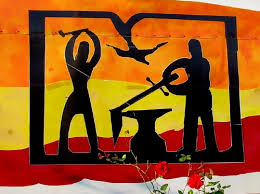
Universal peace, with no military conflict or training, will prevail because the implements of warfare will be turned into farming equipment. They will beat their swords into plowshares and their spears into pruning hooks (Isaiah 2:4b; Joel 3:10; Micah 4:3). In the passage in Joel the expression is reversed: Beat your plowshare into swords. The word plowshares refers to instruments for stirring up the soil in some way, and, so far as concerns the capability of conversion into swords, these may as well have been plowshares as anything else. The plowshare was a small piece of iron, which somewhat resembled a short sword, and might easily have been beaten into one. With equal facility a sword could have been changed into a plowshare.8 Nation will not take up the sword against nation, nor will they train for war anymore (2:4c).
Peace will not come by human achievement or the United Nations, but because of ADONAI’S presence in Jerusalem. At that time Israel will be filled with God’s Spirit (Ezeki’el 36:24-30), and her sins will be forgiven (Jeremiah 31:31-34). What Isaiah describes here is something that is going to be true of Jerusalem in the future. But then he contrasts that with Jerusalem’s present pathetic position of his day.




